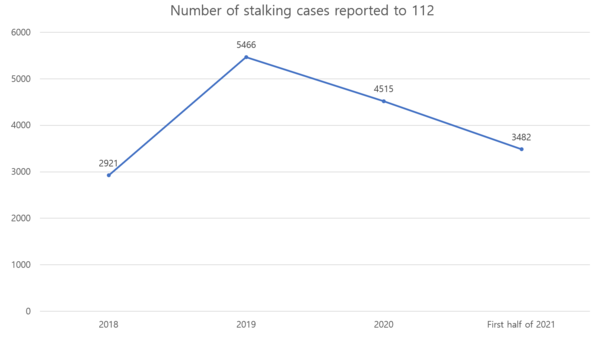
On March 23, a terrible murder occurred causing public outrage. Kim Taehyun, the perpetrator, killed a woman, her mother, and even her younger sister. He had been stalking her since before the crime, and until recently. He committed a premeditated crime in anger at the victim's refusal to meet him. Such violent crimes resulting from stalking consistently occur. However, the crime of stalking was defined as a misdemeanor, making it difficult to impose severe punishment on the perpetrator. Recognizing the limitations of this law, the National Assembly passed the stalking punishment act, and it will come into force on October 21 this year.

The perpetrator of the stalking murder case, Kim Taehyun

Excessive obsession leading to crime
As the number of stalking crimes increases every year, the need to acknowledge the problem of stalking has begun to emerge. The police have established and managed stalking under the 112 emergency crime reports since June 2018. Since then, the number of stalking crimes reported to 112 was 2,921 in 2018, 5,466 in 2019, 4,515 in 2020, and 3,482 in the first half of 2021. There were also problems that stalking leads to violent crimes such as assault and murder. In July this year, a woman in Jeonju killed her ex-boyfriend because he deleted her phone number. The woman was confirmed to have stalked the victim for 7 months after breaking up. As this case shows, stalking appears to be the harbinger of powerful violent crimes. According to the National Police Agency's "Status of arrest by type of dating violence" data in 2020, stalking is combined with violent crimes such as 31 murders, 51 cases of sexual violence, and 898 cases of confinement and intimidation. In response to this, Nam Insoon, a member of the National Assembly said, "As seen in stalking murder cases, systems should be improved to protect victims considering that stalking leads to life-threatening violent crimes such as sexual violence and murder."1) Since violent crimes that threaten people's lives are occurring, society must raise its guard against stalking crimes.
Under the current law, stalking was classified as continuous harassment by the Minor Offenses Act, and the level of punishment was only a fine of less than 10 thousand won or 29-day detention. The term 'continuous harassment' as defined in the bill means repeated activities such as visiting and following by intention. The problem with this bill is that the severity of punishment is extremely low. There is no punishment if there is no direct action, and indirect acts such as watching and following cannot be punished if actions are not proven. In many cases, there were no penalties at all. According to the data received from the National Police Agency by Park Wansoo, a member of the National Assembly's Public Administration and Security Committee, only 488 cases of stalking crimes were punished under the law last year. 4,027 cases, 89.2% of the stalking crimes reported last year, were found to have been closed by warning the perpetrator or informing the victim of the stalking accusatorial procedure. Punishing stalking crimes lightly is becoming a social problem. Therefore social movements to define stalking as a crime are spreading.

A demonstration by civic groups and political parties for enactment of the Stalking Punishment Act

Lawmakers voting on the passage of the Stalking Punishment Act
Towards heavier punishment
The stalking punishment act went through a long process from being proposed to finally being passed. It was in the 1990s that stalking crimes gained consciousness in Korean society. A bill to punish stalking started with the 'Special Act on Stalking Punishment' proposed by Kim Byungtae, a member of the 15th National Assembly, in 1999. However, the bill failed to pass the National Assembly and was scrapped without proper discussion. Kim said, "The punishment has been neglected due to the lack of social awareness and inadequacies in current regulations despite the serious mental and physical damage to the victims due to the persistence of the stalking act. We need to define stalking as a crime and criminalize it to ensure the freedom of privacy of individuals."2) The bill was unable to cross the threshold of the plenary session at a stage not long after social discussions began. Since then, the bill has been proposed 14 times until the 20th National Assembly. In 2016, in the 20th National Assembly, the 'Stalking Crime Punishment and Protection of Victims Act' was proposed by Jung Chounsook of the Gender Equality and Family Committee. The bill defined stalking as an act that repeatedly violates the freedom of others without their consent and urged the investigative agencies and the judiciary to take active temporary protection measures. Despite the details of the bill of law, the National Assembly Legislative and Judiciary Committee didn't pass the law and said in its review report, "Stalking has various types of behaviors, and it is difficult to distinguish it from simple expressions of affection or courtship. Serious stalking can be punished as a crime of assault or intimidation under criminal law, so it should be carefully considered."3) Therefore, the law to punish stalking was not enacted until the 20th National Assembly.
Finally, the stalking punishment act was passed by the 21st National Assembly on March 24 this year, 22 years after the bill was first proposed, stipulating that stalking acts equivalent to a crime can be punished. The law is set to take effect on October 21. It defines stalking as a crime if it is a repetitive act of approaching someone without justifiable reasons, waiting or watching the victim around his or her home or workplace. Causing anxiety or fear by sending the victim mail, text messages, and videos are also included. Under the act, perpetrators will face imprisonment of up to three years or a fine of up to 30 million won. If they are found to have used weapons, the maximum penalty increases to five years in prison or a fine of up to 50 million won. When a victim reports a stalking act, the police must immediately go to the scene to stop it, warn about punishment, and conduct a criminal investigation that separates the victim from the stalker. It may also be possible that emergency measures are taken to prohibit stalking perpetrators from going within 100 meters of the victim or making contact using telecommunications media. Failure to comply with the police orders will result in a fine of up to 10 million won. Jung Chounsook said, "It is significant that prompt intervention has been possible through emergency measures and provisional measures since the law was passed."4) In other words, previously when stalking was reported, there was no legal basis for the police to immediately protect the victim, but due to the passage of the bill, now faster stalking protection measures can be implemented.

A member of the National Assembly, Nam Insoon
Is it a perfect law?
However, ahead of the law's implementation, experts have pointed out legal loopholes remaining in the bill. Especially controversial is the fact that the stalking punishment act includes "the crime not prosecuted against objection." It is a crime that cannot be punished if the victims express that they do not want to punish the perpetrator. Consequently, the perpetrator may exploit this point to avoid punishment. Lee Soojung, a criminal psychology professor at Kyunggi University, said, "Because the crime is not prosecuted if the victim objects, stalkers can constantly follow victims and put pressure on them. So, the victims may agree and drop the charges out of fear."5) In other words, if the victim is forced by the perpetrator, the punishment for the crime may not be properly carried out. Therefore, there are concerns that the crimes that are not prosecuted due to the victim's objection could cause them to suffer further stalking. There are also questions about the effectiveness of the "emergency measures." Article 4 of the stalking punishment act states the emergency measure that the police can prohibit the stalking perpetrator from going within 100 meters of the victim. However, Seung Jaehyun, a researcher at the Korea Criminal Policy Institute, said, "100 meters is the distance that adult men can cover in 15 seconds. If necessary, we need to be flexible in making legal provisions to keep the perpetrators and victims further apart."6) He pointed out that there is an insufficient part of the access ban stipulated in the current article. In addition, it is also problematic that even if the perpetrator violates such emergency measures, the fine is less than 10 million won. In the end, these problems are raising the need for an amendment to the stalking punishment.
To solve the problems, a number of measures are being proposed. On June 10, Nam Insoon proposed an amendment to the stalking punishment act. The bill states the removal of "the crime not prosecuted against objection" article and protection measures for victims. Nam said that the article should be deleted in consideration of the possibility of abuse. Specific implementation measures were also prepared to protect victims. Meanwhile, another argument has been proposed to protect victims suffering from stalking crimes. On July 27, Yang Jungsook, a member of the National Assembly, proposed that stalking crime victims be included in the emergency welfare support list. Yang said, "Victims experience not only psychological damage but also suffer from threats to their livelihood. Nevertheless, there is no legal basis for protection or support for stalking victims."7) She pointed out that there is a limit to protecting victims under the current law and suggested strengthening the support. In addition, a system is being prepared to manage victims. On July 25, the National Police Agency announced a project "advanced the Abuse Prevention Officer business management system." In the existing system, 'stalking damage items' will be established to manage victims according to their level of damage. Furthermore, in conjunction with the 112 mobile management system, a separate table will be installed to inquire about the stalking history when the report is received. It allows the police to better understand the victim's situation and respond appropriately. In this way, fundamental measures will be needed to prevent stalking crime and its damage.
For our ordinary days
Stalking crime is on the rise every year. Nevertheless, stalking has been perceived as an expression of affection. Laws based on that perception created situations in which victims could not be saved. Thus, the stalking punishment act, enacted in 22 years, is significant in that stalking is stipulated as a clear crime. In addition, it is noteworthy that there is a basis for punishment for stalking, but the bill is not yet perfect. In order to eradicate stalking crimes in the future, it will be necessary for the law to be supplemented in a way that protects the victim and severely punishes the perpetrator.
1) Shim Jaemin, "Nam Insoon, Member of the National Assembly, Pushed to Revise the Stalking Punishment Act to Strengthen the Protection of Victims", Sisun News, June 11, 2021
2) Kim Taegyu, "Stalking Punishment Act Passed in 22 Years…Victim Protection Needs to Be Supplemented", Today News, April 1, 2021
3) Park Hayan, "Stalking, Shattering Victim's Daily Life…Punishment Is Only '100 Thousand Won'", Nocut News, April 28, 2020
4) Kim Minjeong, "You, Who Waited in Front of Someone's House Every Day, Are Now Punished as a 'Stalker'", Chosun Biz, March 25, 2021
5) Lee Junghyun, "Lee Soojung, "The Crime Not Prosecuted Against Objection Clause Must Be Excluded from the Stalking Punishment Act"" JTBC NEWS, April 2, 2021
6) Kwon Sunmi, "[Stalking, the Forerunner of Murder] Will the Law Stop Stalking Properly?..." Loopholes of the Stalking Punishment Act"", YONHAPNEWS AGENCY, May 31, 2021
7) Kim Seojoong, "Yang Jungsook, "Including Stalking Victims in the Emergency Welfare Support List, Protected by Law"" Gukje News, July 27, 2021
Yoon Kim Eunji / Reporter
smt_kej@sookmyung.ac.kr
Park Sung Iyoung / Reporter
smt_siy@sookmyung.ac.kr


